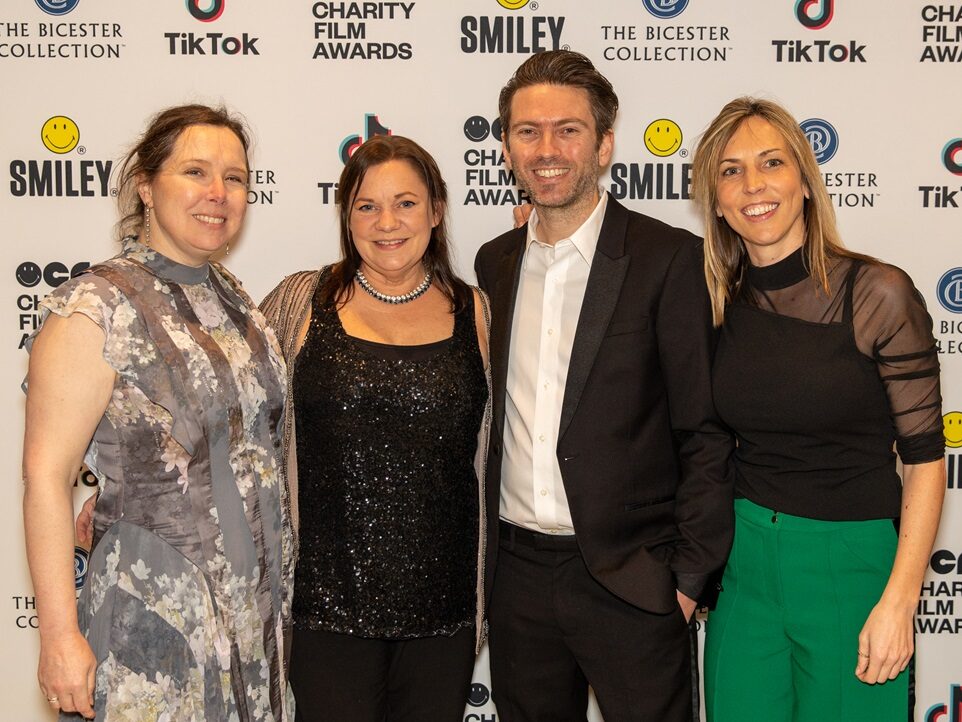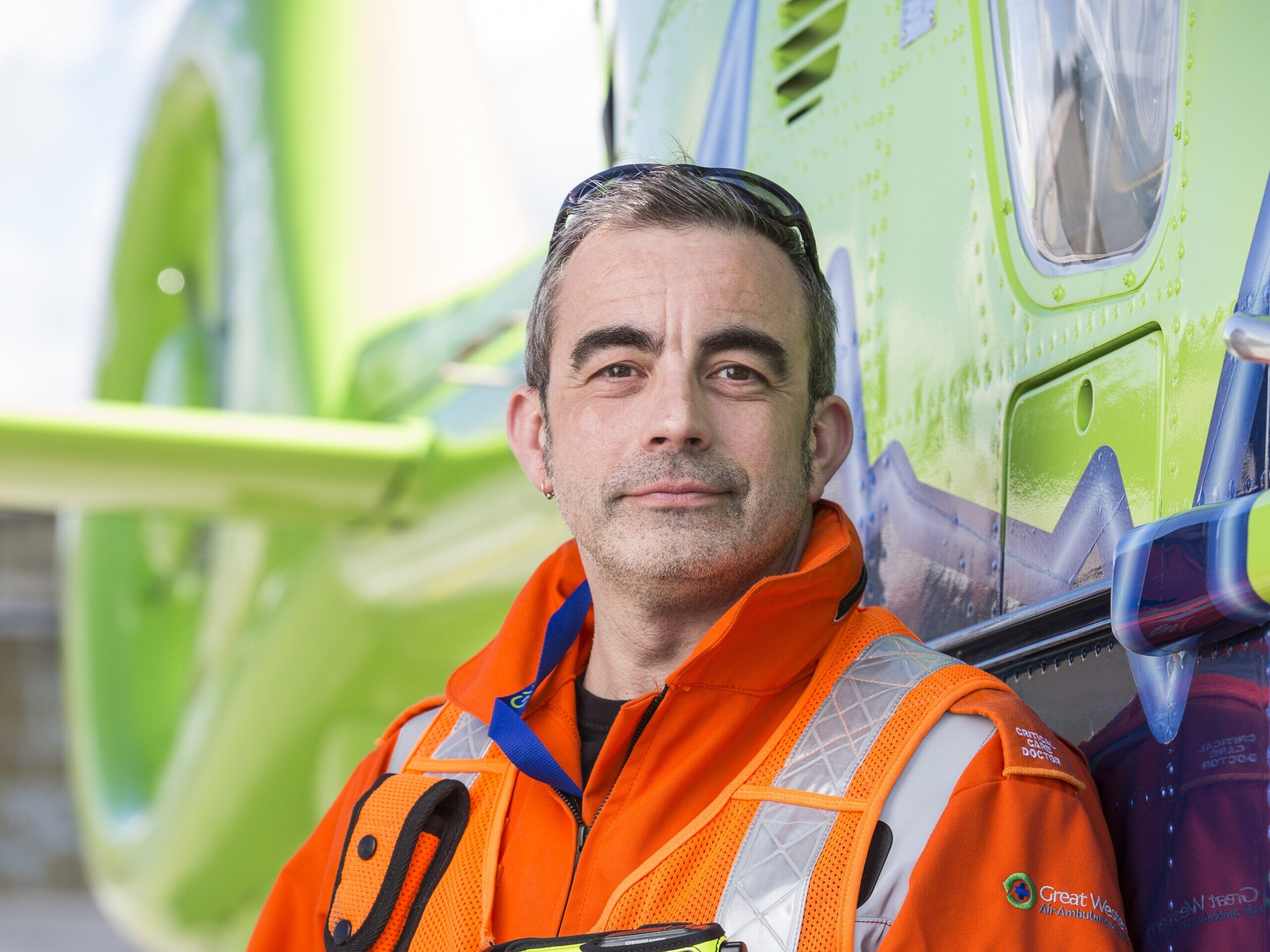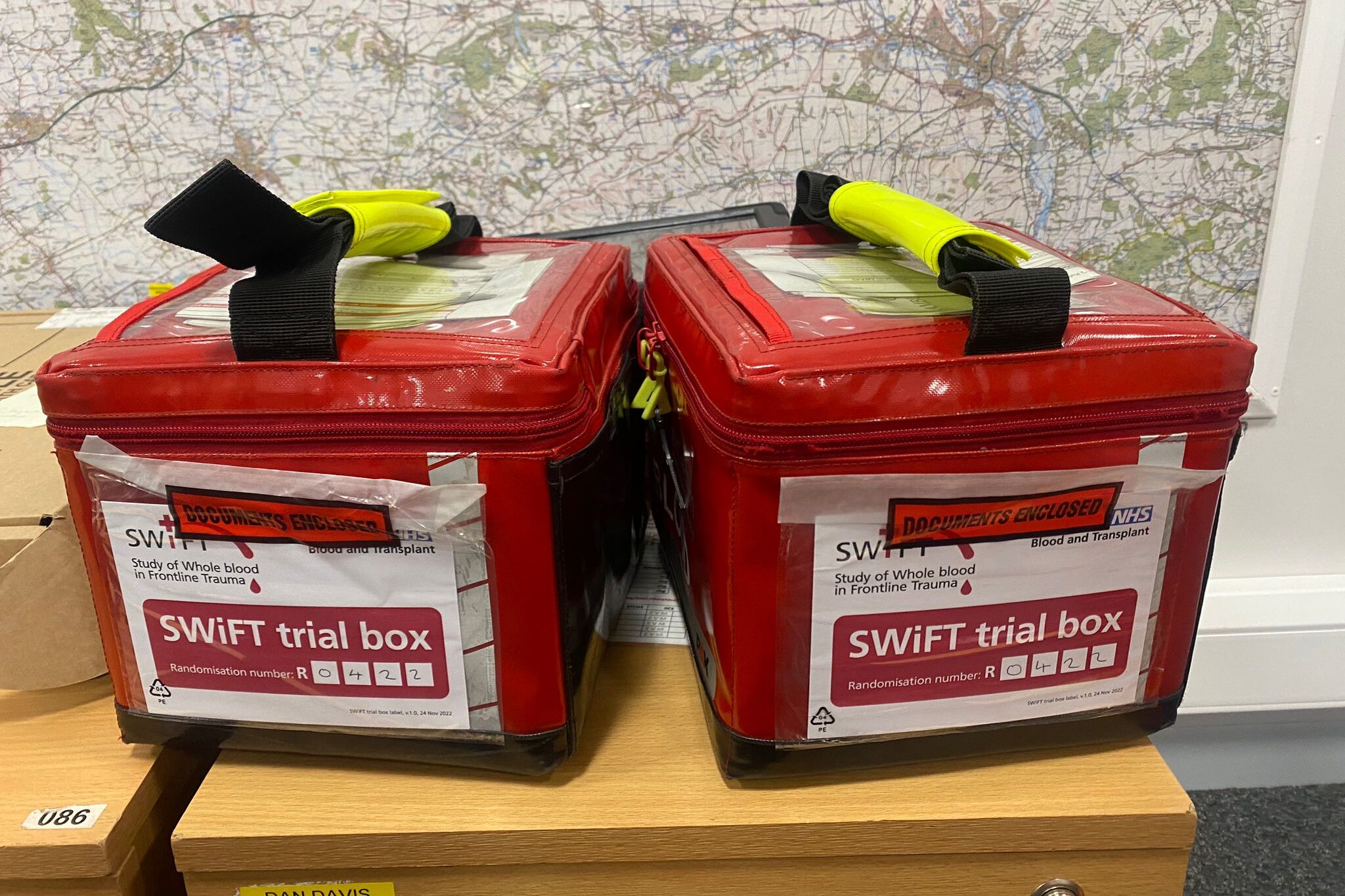
Our Impact in 2023
March 8, 2024
With your support
April 16, 2024New leadership and new recruits
We welcomed some new leaders in our clinical team, with Dr Andy Lockyer, Dr Andrew Heavyside and Tim Ross-Smith stepping up. Our thanks go to Dr Ed Valentine, Dr Richard Jeavons and Specialist Paramedic Pete Reeve for their hard work and commitment leading the team through the previous years.

We were recognised for our achievements
The King’s Ambulance Service Medal
Advanced Clinical Practitioner in Critical Care, Vicki Brown, received this award in the New Year Honours for distinguished service marked by exceptional ability, merit and conduct.
“Vicki has dedicated her career to advancing paramedic practice and delivering improved pre-hospital patient care. She remains an example to all, acting as a superb role model and inspirational frontline clinical leader.”
Supporter of the Year – winner
The Polledri family and Lisa Mazzotta, our Great Western Hearts Ambassadors, were winners at the Air Ambulances UK Awards of Excellence for raising over £70,000 and installing 16 public access defibrillators in and around Bristol, through the Sam Polledri Foundation. At least two of the defibrillators have already been used on people in cardiac arrest.
Silver People’s Choice Award
People across the country voted for our short film, telling the story of former patient, Jasmine, to win an award. Jasmine’s proud mum said at the ceremony, “I get to go home and give my daughter a kiss and cuddle tonight because of GWAAC. Tonight was inspirational.”
Honorary Fellowship with Gloucestershire University
In November, Critical Care Doctor, Phil Cowburn MBE, received an Honorary Fellowship in recognition of his career in emergency medicine and for contributing to the university’s Paramedic Science programme.

Dr Nicky Moore

Masters Degrees Fleur & Pete

MSc For Matt
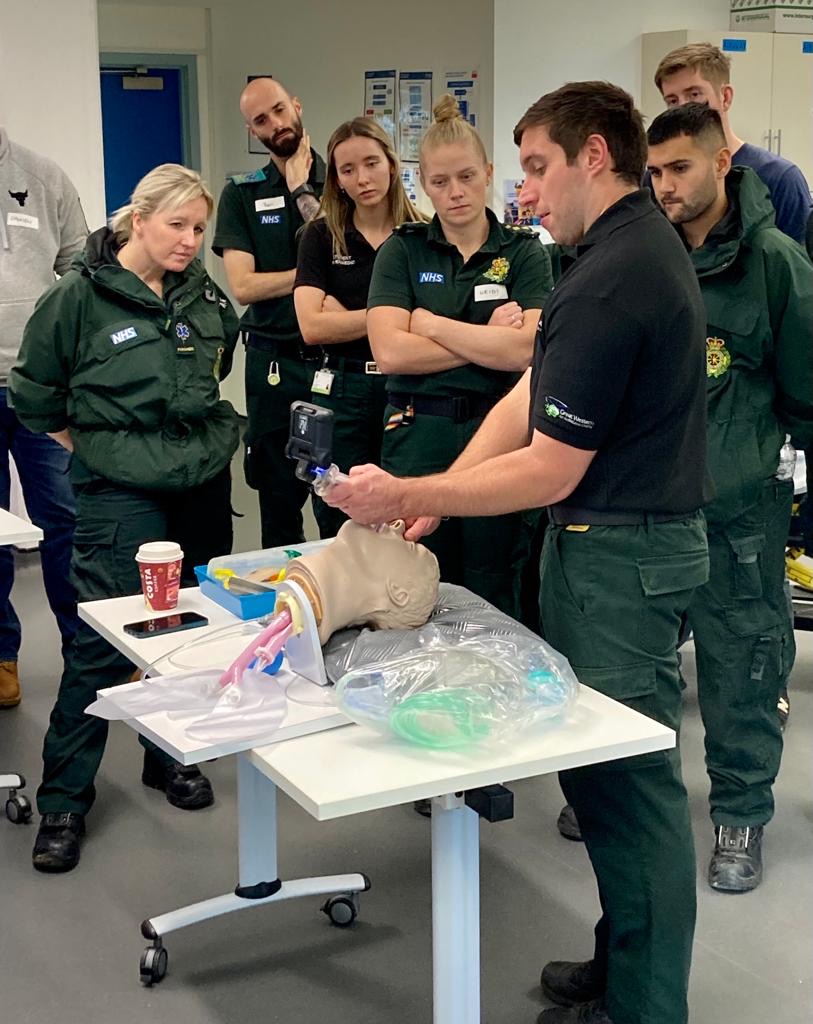
We upskilled ambulance crews through our Clinical Outreach Programme
Four Specialist Paramedics in Critical Care provided training to ambulance crews working in the GWAAC operational area. They delivered four workshops upskilling paramedics and giving them essential skills around critical care.
The project aims to improve care for the patient before our Critical Care Team arrive and achieve earlier and more accurate requests for assistance from our crew. These improvements lead to shorter on-scene times, reducing time to hospital, all of which contribute to better patient outcomes.
Across the four sessions undertaken, around 80 participants were taught theory and participated in simulations which included dealing with traumatic cardiac arrest, penetrating torso injuries, fracture management and paediatric resuscitation, using the Major Trauma and Resus Advice line and preparing for Pre-Hospital Emergency Anaesthesia.
“It’s nice to be in an environment and work on simulations where we can ask questions of the Critical Care Team. I now have a better idea of what they bring to the table.”
Multi Agency Training
In May, GWAAC and Avon Fire & Rescue Service hosted a multi-agency training day at Avonmouth Docks with more than 40 attendees. GWAAC crew members, firefighters, student paramedics from the University of the West of England and paramedics from South Western Ambulance Service’s Hazardous Area Response Team took part in three simulations. Each simulation presented an initial critical problem and ongoing changing circumstances that they worked through and learnt from. The day helped build relationships, prepare for real-life scenarios and develop the paramedics of the future.
“It’s been good seeing how the different services take leadership of different aspects of the simulations. It’s important to know how we all work so we can come together in real-life incidents.”

We refreshed the skills of search and rescue teams in Norway
In May, Dr Andy Holdstock and Specialist Paramedics, Callum Sutton and Jack Kilminster, taught airway management skills to search and rescue nurses and paramedics in Norway. Across two days they ran medical and trauma simulations to refresh their skills when dealing with challenging incidents.
“This trip was a fantastic opportunity to help educate some great clinicians. I also learned from the candidates and instructors… it was great to network with colleagues from a different system; learning from both sides will benefit patients treated in Norway and by GWAAC.”

Crew returned to Ukraine to
teach military and police
In February, Specialist Paramedics in
Critical Care, Pete Reeve, Matt Robinson
and Callum Sutton, returned to Ukraine
as volunteers teaching first responder
care to 200 military and police. With
funding from a generous private
source and the support of GWAAC,
they donated medical equipment and
delivered hands-on practical training
over four days, covering themes such
as bleed control, using tourniquets,
CPR and the triage process.Sharing knowledge with student paramedics
In June, four crew members including Advanced Practitioner, Vicki Brown, joined the University of the West of England for its Distinguished Address Series. Vicki addressed an audience of around 100 student paramedics and GWAAC supporters, sharing her journey into paramedicine and how she is pushing boundaries within the profession. A Q&A session chaired by GWAAC Doctor, Professor Jonathan Benger CBE, gave attendees a chance to ask the crew questions about how to pursue a career in paramedicine in Helicopter Emergency Medical Services.
In October, we joined a multi-year nationwide clinical study alongside nine other air ambulance charities, to look at whether giving whole blood to a major trauma patient improves their chances of survival compared to the current method of using separate blood products (red blood cells and plasma).
Carrying separate blood products means storing them in different treatment bags, keeping them at a certain temperature and administering them separately. This can add time and complexity as well as significant weight to the equipment the crew needs to carry.
Our exposure to a large number of people who experience severe traumatic injuries provided an opportunity to assess the benefits of the new whole blood product.
In April, our new bespoke kit bags were put into use. They were custom-made to contain a series of pouches with everything required for a task in one place and in likely order of necessity. They made an immediate difference to our efficiency at the scene of an incident and restocking in between jobs.
We introduced five sets of kit bags: one for each of our three critical care cars, one for the helicopter and one for training purposes.
“The new bags are speeding up processes, especially setting up kit for Pre-Hospital Emergency Anaesthesia (PHEA); they are helping to improve the care we provide to people in our communities in urgent need of our help.”

Josh's story
Josh, a fit and healthy 34-year-old, suffered a severe brain haemorrhage at his gym in Bristol. SPCC, Matt Robinson, and Critical Care Doctor, Glyn Thomas, rushed to him in one of our critical care cars. They found Josh being managed by an ambulance crew and two off-duty doctors. Matt said, “The priority was to secure his airway and rest his brain to minimise the impact of the injury.” The crew anaesthetised and intubated Josh, prepared him for his journey to hospital and travelled with him in the ambulance to continue his specialist care. Six months and several operations later, Josh is well-recovered and leading a normal life with a few adjustments.
“The speed at which everything happened from all the different points of care, is why I’m here today.”
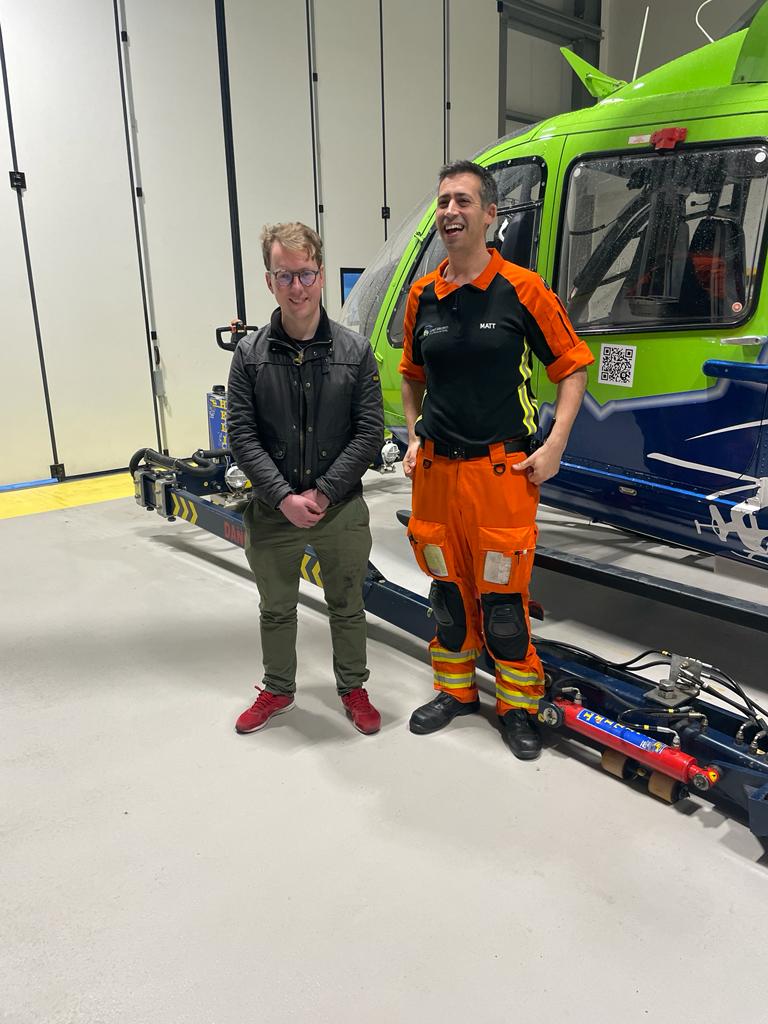

How you can help
Leave a gift in your will
Once you have remembered your loved ones, you can choose to support us well into the future by leaving a gift in your will.
How you can help
Set up a regular gift
Any donation helps our Critical Care Team respond to those in urgent need. By choosing to give a monthly donation, you’ll be helping us plan ahead for long-term improvements.

How you can help
Sign up to one of our events
There’s something for everyone in the GWAAC events calendar! Whether you fancy taking on an epic challenge event, a local 5km run, a community get-together, or one of our annual GWAAC celebrations.
How you can help
Nominate us as your charity of the year
Nominate us as your chosen charity of the year to your employer, so your work friends and colleagues can fundraise for us together.









